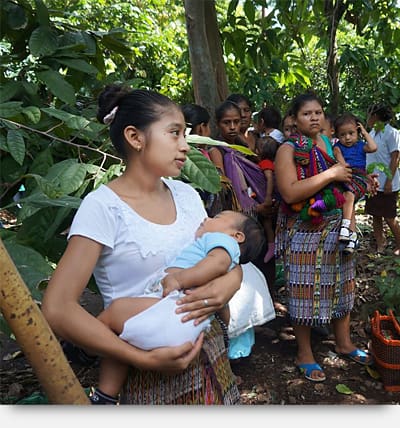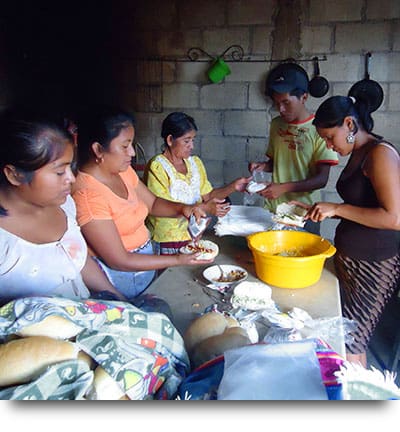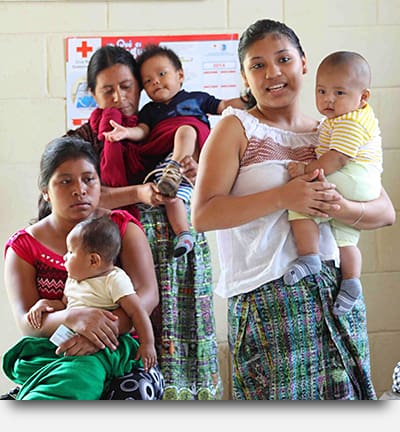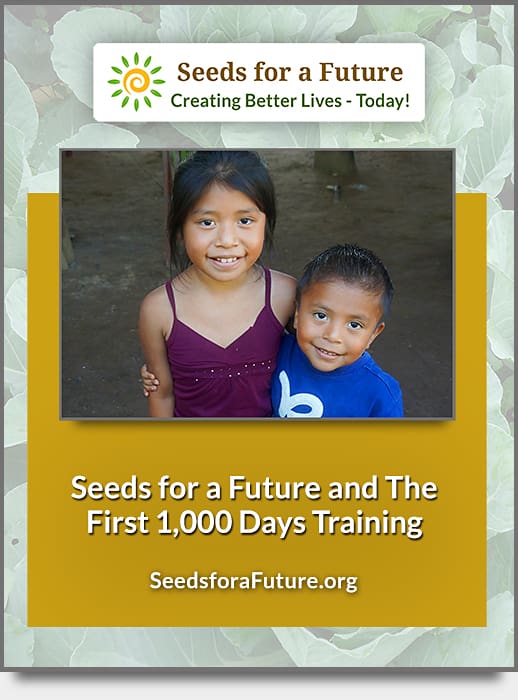Doña Matea is an extensionist with Seeds for a Future. Join her in this video as she describes how she lives and teaches The First 1,000 Days Program.
Nutrition and Health Education
In rural Guatemala, chronic malnutrition and diseases such as stunting affect nearly half of children under five, leading to impaired physical and cognitive development that can last a lifetime.
Families applying our nutrition and health training are better equipped to prevent disease and common debilitating illnesses that often start at home.
The combination of nutrition and health training, and diverse permaculture gardens helps break the cycles of poor health and disease that are prevalent in many rural communities.
Our Nutrition and Health Education Training Includes These Primary Areas:
• The First 1,000 Days Training - Nutrition training for mothers during pregnancy and the critical first two years of their infant's life to avoid the pattern of chronic, generational stunting of infants and children.
• Nutrition Training - Nutrition fundamentals includes the importance of minerals and vitamins and the integration of healthy foods into traditional recipes to avoid chronic diet insufficiencies.
• WASH Program Training - Water, Sanitation, and Hygiene training for safer kitchens and households. Improving health and quality of life by ensuring access to clean water, proper sanitation facilities, and effective hygiene practices.

The First 1,000 Days Training
While good nutrition is always important, it is absolutely vital during the First 1,000 Days of life -- from conception to a child's second birthday.
Because this time period is so critical for developing a healthy child, it’s a priority of Seeds for a Future.
We've adapted the internationally recognized “First 1,000 Days” practices into the culture, agriculture, and practical realities of rural Guatemala.
The First 1,000 Days training and education teaches women of child-bearing age how to achieve good nutrition for both the mother and her baby, and how proper nutrition will positively impact the lives and futures of their children. In addition, mothers learn how proper nutrition will help their own health during their pregnancy and breastfeeding, so they can remain strong and capable for themselves and their families.
When families have stable access to sufficient food, and when that food is nutritious and healthful, all family members can contribute their share to the creation of a better, more successful future for their family, their community, and for Guatemala.
Nutrition Training and Coaching
Our family coaching program begins with a review of the unique needs and resources of each family entering the Program.
Based on what the predominant diet needs are for the family at the time, a customized outline of which greens and vegetables would most benefit their health and wellness is created.
The Seeds training includes the family's garden design, creation, and production methods for producing nutritious plant and animal foods at home, affordably and sustainably.
As food production methods are established, our team’s weekly visits begin to include information on nutrition -- what it is, how various nutrients benefit the body, what foods supply which types of nutrition, and how better nutrition will help their children and other family members have better lives.

We also help families use their home-grown nutrition in daily meals.
Staff and families have jointly created recipe books to share among participating families.
Most of the recipes are for familiar local dishes, enhanced with the addition of nutrition-packed foods.
WASH Training
The Seeds WASH training equips families with the knowledge and skills necessary to maintain safer kitchens and households. By prioritizing the availability of clean water, we aim to significantly reduce the risk of waterborne diseases and enhance overall community health. Families learn how to safeguard their water sources and implement effective purification techniques, ensuring that every family member has access to safe and potable water.

Improving sanitation facilities is central to the WASH Program, which plays a crucial role in preventing disease transmission. Seeds for a Future collaborates with families to design and implement sustainable sanitation solutions tailored to their specific needs and resources.
Through practical training sessions, families gain awareness of personal and food hygiene, which in turn has a positive ripple effect on their quality of life. From proper handwashing techniques to handling and preparing food safely, these practices help safeguard families against common illnesses and improve their overall well-being.
The INCAP Research Study
Because of the unique approach of the Seeds for a Future Program, from 2014 to 2017, an internationally-funded, randomized controlled trial study by the Institute for Nutrition of Central America and Panama (INCAP) scientifically documented the success of the Seeds for a Future program.
The study was conducted over a three-year period, and INCAP’s research revealed that the Seeds for a Future Program cut childhood anemia rates from 47% to under 5% in families participating in the Program, over a 90% reduction.
“In conclusion, this study provides evidence that an integrated approach involving health, nutrition, and agriculture with a duration of at least twelve months of follow up may have a significant positive impact in nutrition outcomes, especially in hemoglobin and iron status biomarkers, of mothers and children under five years of age in rural populations.”
“This is the first time that an integrated health, nutrition, and agriculture project demonstrated a positive outcome in biochemical biomarkers in women and children.”
Let's Stay Connected
Receive our latest stories and updates about restoring nutrition and health, the impact of sustainable change, and the power of self-reliance.
Our Partners:









